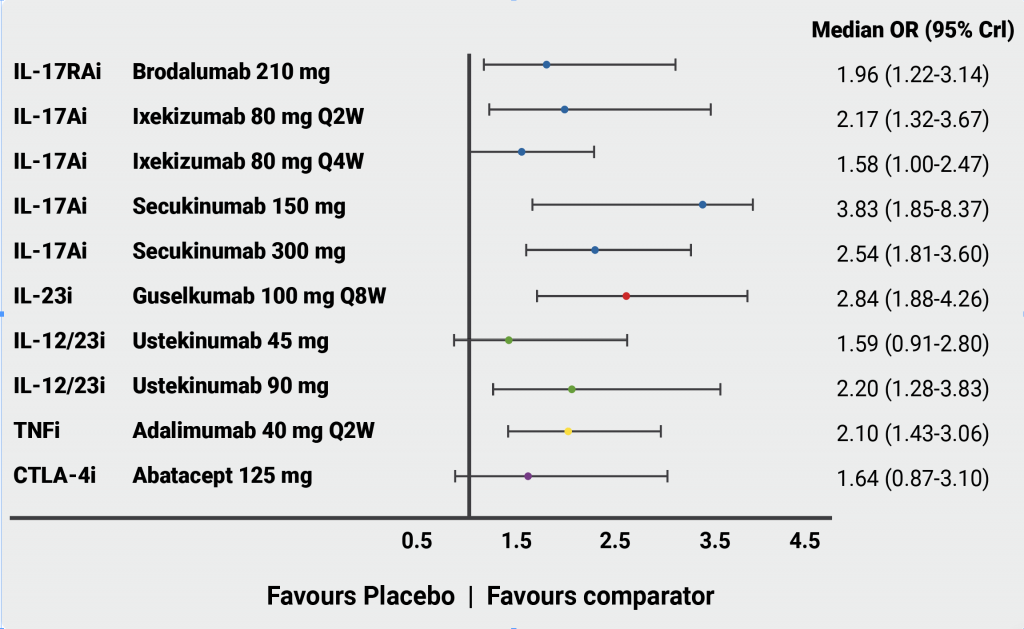“Amazing new medications are being developed that are going to change the way you approach psoriasis over the next decade,” Prof. Bruce Strober (Yale University, CT, USA) started his presentation [1]. One new study tested apremilast in patients with mild and moderate psoriasis, defined by an affected body surface area (BSA) of 2–15%, a Psoriasis Area Severity Index (PASI) of 2–15, and inadequate control by topical agents [2]. “These patients had a Dermatology Life Quality Index of around 10 and that means they suffered a lot, even though BSA and PASI are low,” explained Prof Strober [1]. The primary endpoint, static Physicians Global Assessment (sPGA) 0 or 1 (i.e. clear or almost clear skin) at week 16, was achieved by 21.6% with apremilast versus 4.1% with placebo. A label update is foreseen for the use of apremilast in this population.
A different drug in the form of a once-daily allosteric tyrosine kinase (TYK)2 inhibitor is deucravacitinib, which will likely be approved in about 1 year. As it does not bind to the kinase domain, it is selective but to a regulatory domain of TYK2, thus specifically blocking TYK2. In the 2 phase 3 trials POETYK PSO-1 (NCT03624127) and POETYK PSO-2 (NCT03611751), deucravacitinib demonstrated impressive results versus placebo and apremilast [3]. “Deucravacitinib has all the makings of an important medication,” Prof. Strober emphasised.
Another rising star is bimekizumab. The IL-17A/F inhibitor led to PASI 90 responses of 90.8% at week 16 in patients with moderate-to-severe psoriasis in the BE READY trial (NCT03410992) [4]. This level of efficacy was stable in maintenance up to 52 weeks [1]. Notable safety issues included oral Candida infections, which occurred in 10–20% of patients in different studies.
The IL-36 inhibitor imsidolimab exhibited good results for generalised pustular psoriasis (GPP) in a phase 2 study (NCT03619902) in which 6 out of 8 patients, affected with a baseline BSA of 24%, reached the primary endpoint with about 94% reduction in erythema with pustules [5]. Spesolimab, a drug with the same mode of action, also holds promise for GPP as 5 out of 7 enrolled patients achieved a GPP Physician Global Assessment score of 0 or 1 by week 1, and all 7 patients at 4 weeks after a single dose of spesolimab [6]. “We will soon see the pivotal study with more patients, and this shows hopefully that the drug carries out its rapid efficacy for people with GPP,” Prof. Strober commented.
- Strober BE. Psoriasis: New data. Session S009, AAD VMX 2021, 23-25 April.
- Stein-Gold L, et al. Session psoriasis 2021, Maui Derm 2021, 25-29 January.
- Armstrong A, et al. Session S033, AAD VMX 2021, 23-25 April.
- Gordon K, et al. Late-breaking abstract, AAD VMX 2020, 12-14 June.
- Strober BE. Symposium for Inflammatory Skin Disease 2021, 10 April.
- Bachelez, et al. D3T01.1E, EADV 2018, 12-16 September.
Copyright ©2021 Medicom Medical Publishers
Posted on
Previous Article
« COVID-19 in children – cutaneous involvement is common Next Article
Psoriasis and hidradenitis suppurativa during COVID-19: keep calm and carry on »
« COVID-19 in children – cutaneous involvement is common Next Article
Psoriasis and hidradenitis suppurativa during COVID-19: keep calm and carry on »
Table of Contents: AAD 2021
Featured articles
Letter from the Editor
Late-Breaking Abstracts
Small molecule effective in moderate-to-severe psoriasis
Bruton’s tyrosine kinase inhibition promising for pemphigus vulgaris
Bimekizumab superior to secukinumab in psoriasis
Etrasimod – a new mode of action for treatment of atopic dermatitis
Women at higher risk for dermatologic side effects during immunotherapy
Novel easy-to-use foam formulation clears scalp psoriasis in one-third of patients
Anti-cholinergic gel demonstrates superior long-term tolerability and efficacy in axillary hyperhidrosis
Psoriasis – The Beat Goes On
Psoriasis: The treatment armamentarium continues to grow
Psoriasis management in times of COVID-19: the knowledge is growing steadily
Lower burden of high-risk atherosclerotic plaques in psoriasis patients treated with biologics
COVID-19: What Dermatologists Need to Know
Psoriasis and hidradenitis suppurativa during COVID-19: keep calm and carry on
COVID-19 in children – cutaneous involvement is common
Cutaneous reactions after COVID-19 vaccination: an update
Novel Developments in Sun Protection
Sunless tanning and other developments in sun protection
What Is Hot in Atopic Dermatitis
Comorbidity is common in adult and paediatric atopic dermatitis patients
Significant improvements in the system armamentarium for AD treatment
Topical pan-JAK inhibitor cream safe and efficacious in atopic dermatitis
Hairy Matters – What Is New in Alopecia
Allergies: an underrated factor in alopecia pathogenesis
Botulinum toxin A: a contradictory role in hair loss
Platelet-rich plasma in androgenetic alopecia – hype or hope?
Acne – New Developments
New therapeutic options add value to current acne treatment
Nicotinamide and probiotics can support acne therapy
Pearls of the Posters
Related Articles
September 17, 2021
Unresolved needs for patients with PsA despite growing therapeutic options

July 21, 2022
How to treat enthesitis in 2022
January 14, 2022
Selective IL-23 inhibition: a new option in active PsA
© 2024 Medicom Medical Publishers. All rights reserved. Terms and Conditions | Privacy Policy

